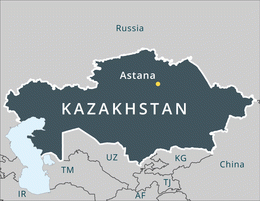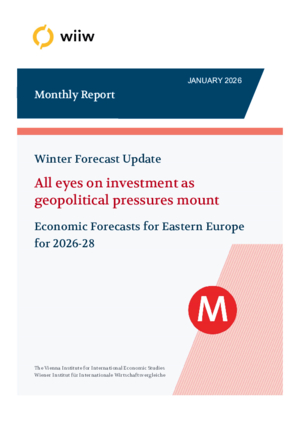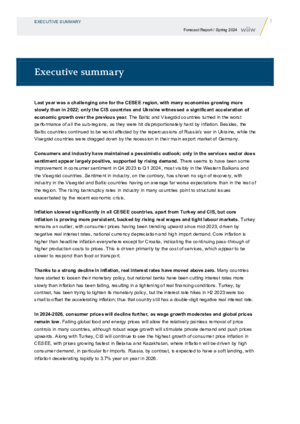Kazakhstan

| FORECAST* | ||||||
|---|---|---|---|---|---|---|
| Main Economic Indicators | 2023 | 2024 | 2025 | 2026 | 2027 | 2028 |
| Population, 1000 persons | 19900 | 20159 | . | . | . | . |
| GDP, real change in % | 5.1 | 5.0 | 6.5 | 4.5 | 5.0 | 5.0 |
| GDP per capita (EUR at PPP) | 25530 | 26900 | . | . | . | . |
| Gross industrial production, real change in % | 4.4 | 3.2 | 7.5 | . | . | . |
| Unemployment rate - LFS, in %, average | 4.7 | 4.7 | 4.6 | 4.6 | 4.5 | 4.5 |
| Average gross monthly wages, EUR | 738 | 798 | . | . | . | . |
| Consumer prices, % p.a. | 14.5 | 8.7 | 11.4 | 10.0 | 8.0 | 6.0 |
| Fiscal balance in % of GDP | -2.4 | -2.6 | -2.8 | -2.5 | -2.0 | -1.5 |
| Public debt in % of GDP | 24.0 | 24.7 | 24.0 | . | . | . |
| Current account in % of GDP | -3.6 | -2.7 | -3.9 | -4.3 | -4.5 | -4.5 |
| FDI inflow, EUR m | 5293 | 1829 | -778 | . | . | . |
| Gross external debt in % of GDP | 60.8 | 58.6 | 57.7 | . | . | . |
Basic data are continuously updated.
* Forecasts are changed beginning of January, April, July and November.
See Press Conferences.
Monthly Report No. 1/2026
Vasily Astrov, Alexandra Bykova, Selena Duraković, Meryem Gökten, Richard Grieveson, Maciej Grodzicki, Ioannis Gutzianas, Doris Hanzl-Weiss, Gabor Hunya, Branimir Jovanović, Biljana Jovanovikj, Niko Korpar, Dzmitry Kruk, Sebastian Leitner, Isilda Mara, Emilia Penkova-Pearson, Olga Pindyuk, Sandor Richter, Marko Sošić, Bernd Christoph Ströhm and Marina Tverdostup
wiiw Monthly Report No. 1, January 2026
58 pages including 6 Tables and 15 Figures
Executive summary
Olga Pindyuk
in: The Crisis is Over, but its Scarring Effects are Hindering Recovery
wiiw Forecast Report No. Spring 2024, April 2024 , pp. I-VII
Details

